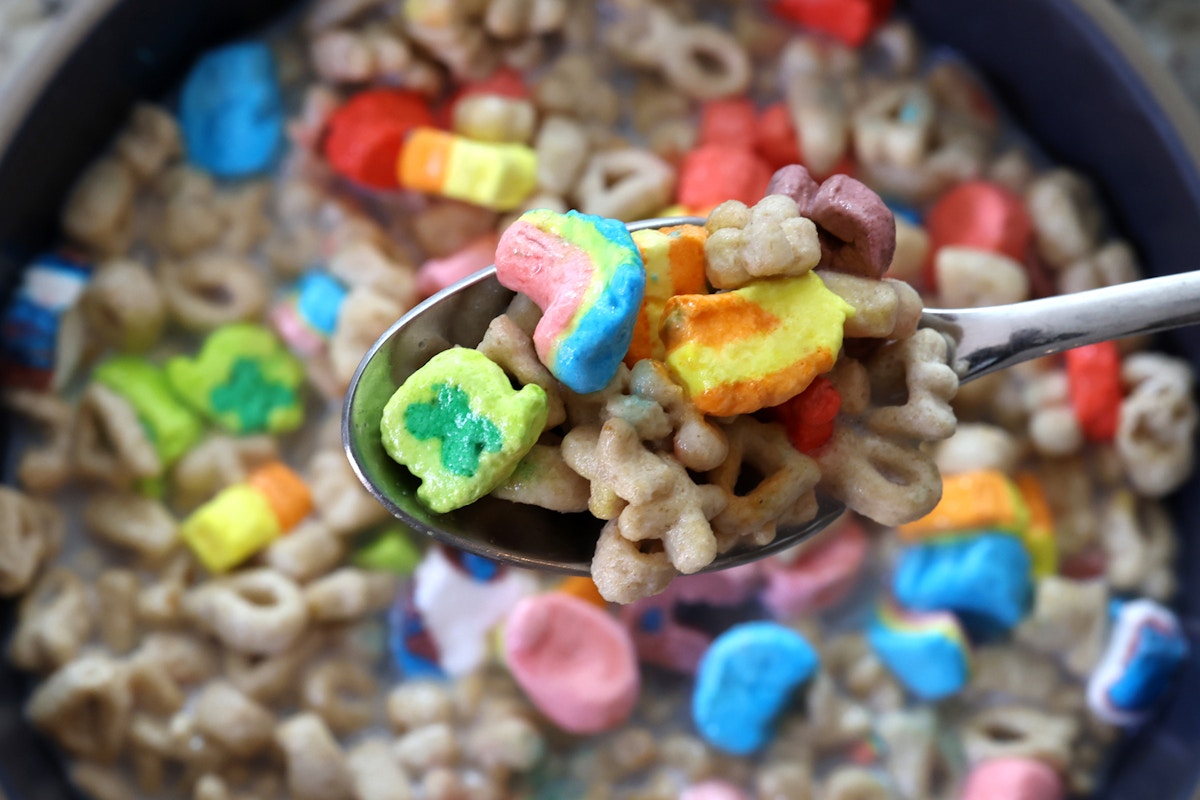
The makers of Fruity Pebbles, Froot Loops, Blessed Charms, and other well-known cereal makes are bitterly lobbying from a new Food items and Drug Administration proposal that would avert them from labeling their merchandise as “healthy.”
The proposed Food and drug administration rule mandates that food items labeled as healthful need to consist of a important food items group — these kinds of as dairy, fruits, or complete grains — and will have to in shape selected restrictions on saturated unwanted fat, sodium, and added sugars.
The rule limitations cereals, for example, to no extra than 2.5 grams of sugar per serving in buy to be labeled as wholesome — a restriction foodstuff manufacturers assert would exclude in excess of 95 p.c of prepared-to-try to eat cereals on the sector.
In reaction, processed food stuff organizations that deliver a wide variety of snacks, baked merchandise, pastas, and frozen pizzas are difficult the guidelines ahead of they are finalized by the agency. Between the most vocal food companies are producers of superior-sugar cereals, which are largely promoted to youngsters and have been criticized as a driver of the weight problems epidemic in America.
In a joint filing made last thirty day period, the greatest cereal producers in the country — Standard Mills, Kellogg’s, and Write-up Consumer Brands — decried the proposed dietary conditions and threatened to file a lawsuit, hard the pointers as a violation of corporate free speech rights.
The rule, “if finalized in its present kind,” the corporations wrote, “would be open up to authorized obstacle in that it violates the 1st Modification by prohibiting truthful, non-deceptive promises in an unjustified way and also exceeds FDA’s statutory authority in various means.”
The notion of a lawful problem might not be an idle menace.
The public comment docket consists of a filing from the Washington Authorized Basis, a shadowy nonprofit that litigates esoteric and generally controversial enterprise passions. The group submitted a letter in opposition in the type of a legal brief, laying out a broad scenario for a future court docket obstacle versus the Fda pointers.
The business contended that the healthier labeling demands are an unconstitutional overreach of government power. Foodstuff corporations, the Washington Legal Foundation argued, have “constitutionally shielded business speech” rights covering their capability to use the time period “healthy” to explain their extra sugar items.
The Fda, the Washington Lawful Basis wrote in its short, “cannot explain why buyers can’t make their individual healthier choices based mostly on [nutrition labeling] information. Somewhat, it seeks to restrict the food companies’ speech.”
The team does not disclose its donors and did not respond to a request for remark. In previous years, the Corn Refiners Affiliation, a foyer group that signifies the substantial fructose corn syrup field, has disclosed economical ties to the Washington Legal Basis.
Drug firms, which includes Purdue Pharma, the makers of OxyContin, have also employed the Washington Lawful Foundation to problem govt regulations and set up authorized precedent to lower the capacity for prosecutors to request legal fees for drug enterprise executives.
Conagra, Ocean Spray, the American Frozen Food items Institute, and the American Bakers Affiliation similarly hinted at a lawful danger to the Fda healthy food stuff labeling rule. All 4 companies cited constitutional issues with the proposed labeling requirements in letters to the agency.
The joint submitting from cereal producers not only scorns the labeling rules, but also argues that sugary cereals pose no wellbeing pitfalls and are, in fact, valuable to culture and childhood wellbeing.
The companies said that they watch the “extremely strict” pointers as “alarming” simply because “cereal is just one of the most affordable, nutrient dense breakfast decisions a person — adult or boy or girl — can make … with a broad array of selections to go well with unique cultures, preferences, and style.” Cereals, the firms claimed, are previously regarded for “nutritional positive aspects,” specified their inclusion in a variety of federal plans that “serve the nation’s vulnerable populations,” these as the Special Supplemental Diet System for Women of all ages, Infants, and Children and the Nationwide Faculty Lunch Plan.
The corporations billed that cereal “delivers on nutrition when eaten by yourself, but when eaten as section of breakfast, it elevates the nutrition further,” with cereal eaters exhibiting an “overall higher diet plan high quality.” As evidence, the submitting cites a 2019 examine done by in-property scientists utilized by Basic Mills, the maker of Lucky Charms, Cinnamon Toast Crunch, and Trix, among the other brands.
Lucky Charms and Trix consist of close to 12 grams of sugar for each serving, almost 5 situations the limit proposed by the FDA’s nutritious labeling suggestions. What’s much more, scientists have identified that small children normally eat a lot more than two times the advisable serving measurement of cereal for breakfast, indicating that a standard sugary breakfast cereal portion consists of 24 grams of sugar, close to the sugar written content of a Snickers chocolate bar.
The meals manufacturers also stressed that the Fda really should think about that cereals stand for an economical and accessible solution for “families who are encountering foods insecurity.” As evidence, the firms reference an additional Normal Mills-funded analyze to present that very low-profits cereal buyers had better daily calcium intake and across all cash flow amounts, cereal eaters were being connected with superior diet program high-quality.
The agency, they wrote, ought to recognize the helpful function of sugar. “Sugar plays a role in foods past palatability it controls h2o activity, results in texture, adds bulk, and also contributes to flavor complexity,” the submitting states.
Common Mills, Kellogg’s, and the Buyer Models Affiliation, a trade team for cereal companies, similarly filed a protest from the Fda proposal, citing its affect on sugary cereal models. Cereal makers produced half a dozen different filings, counting different trade teams and person protest letters from producers.
Impartial scientists, nonetheless, have located that diet plans higher in processed foodstuff and sugar are connected to being overweight, diabetic issues, significant pitfalls of stroke, weight problems-relevant cancers, hypertension, and dental illnesses.
Children’s having behavior of high-sugar cereals and treats, various scientific tests have demonstrated, are the driving variable for higher concentrations of childhood obesity. Little ones are also bombarded with promotion for ultrasweet cereals, a dynamic that has been identified to increase the subsequent ingestion of advertised cereals.
The FDA’s shift to discourage sugary diets to little ones and curtail advertising and marketing of these types of foods to small children echoes the Obama administration, when a selection of voluntary rules have been proposed in 2011.
At the time, lobbyists for the foods marketplace mobilized a broad counterassault in Congress, with allied lawmakers inserting provisions into the authorizing legislation to delay the voluntary recommendations. In the course of this struggle, the meals industries employed SKDK, a consulting firm co-started by Anita Dunn, who went on to support control President Joe Biden’s the latest campaign and now serves as his shut adviser in the White Dwelling.
The new proposed rules also increase the groups of foodstuff that might be labeled as balanced, which includes nuts, better-fat fish such as salmon, avocados, and drinking water.
The open up remark time period for the Fda pointers shut on February 16. The company, which has presented firms a few a long time to comply with the rule as soon as it is finalized, is continue to reviewing the responses.






